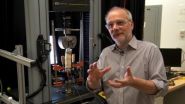(Press-News.org) [TORONTO,Canada, Feb 18, 2014] – A protein that has been known until recently as part of a complex communication network within the cell also plays a direct role in regulating sugar metabolism, according to a new study published in the journal Science Signaling (February 18, 2014).
Cell growth and metabolism are tightly controlled processes in our cells. When these functions are disturbed, diseases such as cancer and diabetes occur. Mohamed Soliman, a PhD candidate at the Lunenfeld Tanenbaum Research Institute at Mount Sinai Hospital, found a unique role for the p66Shc adaptor protein in regulating glucose metabolism and cell growth. This report could lay the foundation for future studies to target adaptor proteins in cancer and diabetes therapy.
Proteins are functional units of cells that assemble in a precise manner to control cellular processes. Specifically, adapter proteins act as linkers or switches to fine tune cellular functions. Soliman and colleagues became interested in studying the p66Shc adaptor protein following observations regarding the role of this protein as a mediator of insulin sensitivity and longevity. Mice deficient in p66Shc have a greatly increased lifespan and show no signs of cancer. These mice also have better glucose tolerance and are resistant to the development of obesity and diabetes. The findings prompted Soliman to take novel approaches to elucidate the mechanism for this. Soliman comments "we found that silencing the adaptor p66Shc in cells, enhances not only glucose metabolism, but also the metabolism of molecules involved in the making the cells building blocks, resulting in overall increased cell growth."
Thus, p66Shc may have evolved to be a switch that responds to nutrient availability. This role for p66Shc as a sensor of energy levels appears to be unique to higher level organisms. Soliman’s current mentor, Dr. Jim Dennis, explains "the gene responsible for p66Shc protein expression is relatively new by evolution standards, as it is not seen in species other than vertebrates". Simply stated, p66Shc acts to suppress insulin signaling and energy metabolism when glucose levels are high, as in the case of diabetes.
Mohamed Soliman is a Vanier scholar and was mentored by the late Dr. Tony Pawson whose research is credited for pioneering the field of signal transduction. Dr. Pawson was the first to describe in the 1980's that proteins contain modular domains that allow them to interact with each other to control cellular communication. Mohamed is currently completing his PhD in the laboratory of Dr. Jim Dennis, a Senior Investigator at the Lunenfeld-Tanenbaum Research Institute, and a professor at the University of Toronto. This study has been done in collaboration with Dr. David Sabatini at the Massachusetts Institute of Technology.
INFORMATION:
Co-authors from the Lunenfeld Tanenbaum include the late Dr. Pawson and Drs. George Fantus, Anas M. Abdel Rahman, Maria Frigolet, and Yong Zheng. Coauthors also include Judy Pawling, Huogan Lu, and Adrian Pasculescu.
Funders include the Canada Research Chairs Program, Canadian Cancer Society, Canadian Institutes of Health Research, Genome Canada through Ontario Genomics Institute, Ontario Research Fund Global Leadership Round in Genomics & Life Sciences, Sydney C. Cooper Program, Mount Sinai Hospital Foundation, and Vanier Canada Graduate Studentship. US funders include (US) National Institutes of Health, (US) Department of Defense, and Howard Hughes Medical Institute.
A new target for cancer and diabetes: A novel role for the adaptor protein p66shc in regulating glucose metabolism
2014-02-15
ELSE PRESS RELEASES FROM THIS DATE:
AAAS panel considers pandemic emergency response
2014-02-15
When a pandemic spreads, health officials must quickly formulate a strategy to limit infections and deaths. That requires sifting through massive amounts of data in a short amount of time and organizing medical personnel who may have little information on the pandemic.
To help coordinate a rapid response to pandemics, a professor at the Georgia Institute of Technology in Atlanta has designed software that combines biological data on the pandemic with demographic data of the at-risk population so that health officials can develop a game plan to limit the pandemic's spread. ...
Scientific racism's long history mandates caution
2014-02-15
Racism as a social and scientific concept is reshaped and reborn periodically through the ages and according to a Penn State anthropologist, both medical and scientific researchers need to be careful that the growth of genomics does not bring about another resurgence of scientific racism.
"What we are facing is a time when genomic knowledge widens and gene engineering will be possible and widespread," said Nina Jablonski, Distinguished Professor of Anthropology. "We must constantly monitor how this information on human gene diversity is used and interpreted. Any belief ...
Communicating the way to the adoption of scientific technologies
2014-02-15
CHICAGO --- James N. Druckman has conducted extensive research on the effects of the politicization of science, which occurs when political interests shape the presentation of scientific facts to fit distinct models of "reality."
A paper on this research will be presented during a symposium held from 3 to 4:30 p.m. Friday, Feb. 14, at the annual meeting of the American Association for the Advancement of Science in Grand Ballroom A in the Hyatt Regency Chicago.
Druckman, the Payson S. Wild Professor in the department of political science at the Weinberg College of ...
Study suggests sleep apnea may contribute to fatigue in multiple sclerosis
2014-02-15
DARIEN, IL – A new study provides evidence that obstructive sleep apnea (OSA) is highly prevalent in people with multiple sclerosis (MS), and it suggests that OSA may be a contributor to the fatigue that is one of the most common and debilitating symptoms of MS.
Results show that one-fifth of MS patients surveyed in a large tertiary MS practice carried a diagnosis of OSA, and more than half were found to have an elevated risk for OSA based on a validated screening tool. Further analysis showed that OSA risk was a significant predictor of fatigue severity, even after ...
Heinrich Jaeger to discuss physics of granular materials at AAAS meeting
2014-02-15
Pour sand from a bucket and it flows like a liquid, but stand on it and it supports weight like a solid. This unusual behavior is a property of granular materials, and it is one of the reasons Heinrich Jaeger, the William J. and Alicia Townsend Friedman Professor in Physics at the University of Chicago, has chosen to focus on these types of materials in his research.
Jaeger will present a lecture on "Granular Matter: From Basic Questions to New Concepts and Applications," at the 2014 annual meeting of the American Association for the Advancement of Science. The talk ...
Growing number of chemicals linked with brain disorders in children
2014-02-15
Boston, MA – Toxic chemicals may be triggering the recent increases in neurodevelopmental disabilities among children—such as autism, attention-deficit hyperactivity disorder, and dyslexia—according to a new study from Harvard School of Public Health (HSPH) and Icahn School of Medicine at Mount Sinai. The researchers say a new global prevention strategy to control the use of these substances is urgently needed.
The report will be published online February 15, 2014 in Lancet Neurology.
"The greatest concern is the large numbers of children who are affected by toxic damage ...
Tired all the time: Could undiagnosed sleep problems be making MS patients' fatigue worse?
2014-02-15
ANN ARBOR, Mich. — People with multiple sclerosis (MS) might assume that the fatigue they often feel just comes with the territory of their chronic neurological condition.
But a new University of Michigan study suggests that a large proportion of MS patients may have an undiagnosed sleep disorder that is also known to cause fatigue. And that disorder – obstructive sleep apnea – is a treatable condition.
In the latest issue of the Journal of Clinical Sleep Medicine, researchers from the U-M Health System's Sleep Disorders Center report the results of a study involving ...
Can citrus ward off your risk of stroke?
2014-02-15
PHILADELPHIA – Eating foods that contain vitamin C may reduce your risk of the most common type of hemorrhagic stroke, according to a study released today that will be presented at the American Academy of Neurology's 66th Annual Meeting in Philadelphia, April 26 to May 3, 2014.
Vitamin C is found in fruits and vegetables such as oranges, papaya, peppers, broccoli and strawberries. Hemorrhagic stroke is less common than ischemic stroke, but is more often deadly.
The study involved 65 people who had experienced an intracerebral hemorrhagic stroke, or a blood vessel rupture ...
Cognitive behavioral therapy for insomnia can reduce health care utilization and costs
2014-02-15
DARIEN, IL – A new study is the first to show decreases in health care utilization and costs following brief treatment with cognitive behavioral therapy for insomnia (CBTI).
Results show that sleep improved in 86 percent of insomnia patients who completed at least three sessions of CBTI. In the six months following treatment, health care utilization decreased and health care-related costs were reduced by more than $200 on average among treatment completers.
"Cognitive behavioral therapy for insomnia is a highly effective treatment, and this study shows that a relatively ...
Is truth stranger than fiction? Yes, especially for science fiction
2014-02-15
CHICAGO – From warp drives to hyperspace, science fiction has continuously borrowed from, and sometimes anticipated, the state of the art in scientific progress. This has resulted in the perception that science and science fiction have a causal relationship, one finding direction from and fulfilling the science fantasy laid out before it.
But that is rarely the case, according to Lawrence Krauss, a Foundation professor in the School of Space and Earth Exploration and the Department of Physics at Arizona State University. No doubt, science fiction has taken inspiration ...



